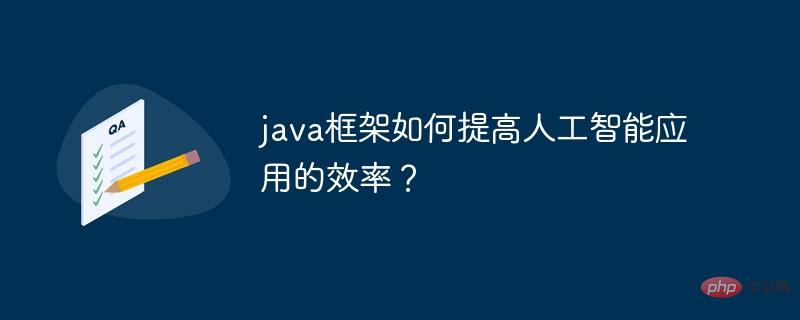 Java
Java
 javaTutorial
javaTutorial
 How does the Java framework improve the efficiency of artificial intelligence applications?
How does the Java framework improve the efficiency of artificial intelligence applications?
How does the Java framework improve the efficiency of artificial intelligence applications?
Java framework improves the efficiency of AI applications: Spring Boot accelerates development and reduces configuration work; TensorFlow for Java simplifies machine learning and provides an easy-to-use interface; Apache Lucene improves information retrieval and enables fast and accurate search; Micronaut enhances performance and achieves high performance and scalability.

How does the Java framework improve the efficiency of artificial intelligence applications
In an era of booming artificial intelligence (AI) applications, efficiency is It's important. Java frameworks provide AI developers with powerful tools and libraries that enable them to build efficient, scalable, and maintainable applications.
1. Spring Boot accelerates development
Spring Boot is a popular Java framework that eliminates a lot of the tedious configuration work required to build Spring applications. By providing automatic configuration and simplified dependency management, Spring Boot can significantly speed up the development process of AI applications.
Example:
@SpringBootApplication
public class AIApplication {
public static void main(String[] args) {
SpringApplication.run(AIApplication.class, args);
}
}2. TensorFlow for Java simplifies machine learning
TensorFlow for Java is an open source machine developed by Google Learning library, which provides Java developers with a convenient interface to build and train machine learning models. The library integrates TensorFlow's extensive capabilities, enabling AI applications to easily perform complex machine learning tasks.
Example:
TensorFlow.Builder tfBuilder = new TensorFlow.Builder();
try (TensorFlow tf = tfBuilder.build()) {
Tensor inputTensor = Tensor.create(new float[] {1.0f, 2.0f, 3.0f});
Tensor outputTensor = tf.session().runner()
.feed("input_tensor", inputTensor)
.fetch("output_tensor")
.run().get(0);
}3. Apache Lucene improves information retrieval
Apache Lucene is a flexible information retrieval library. It is widely used to build search and recommendation systems for AI applications. Lucene provides powerful indexing and query capabilities that enable applications to find and retrieve relevant information quickly and efficiently.
Example:
Analyzer analyzer = new StandardAnalyzer(); IndexWriterConfig iwc = new IndexWriterConfig(analyzer); IndexWriter writer = new IndexWriter(dir, iwc);
4. Micronaut improves performance
Micronaut is a lightweight Java framework that focuses on for high performance and scalability. Micronaut's serverless nature makes it particularly suitable for building AI applications that run on the cloud, as they can automatically scale to meet demand.
Example:
@Controller
public class AIController {
@Get("/")
@Produces(MediaType.TEXT_PLAIN)
public String index() {
return "Hello, Micronaut!";
}
}By leveraging these Java frameworks, AI developers can significantly improve the efficiency of their applications. From simplified development to powerful machine learning libraries and information retrieval tools, Java frameworks provide everything you need to build efficient, scalable, and maintainable AI applications.
The above is the detailed content of How does the Java framework improve the efficiency of artificial intelligence applications?. For more information, please follow other related articles on the PHP Chinese website!

Hot AI Tools

Undresser.AI Undress
AI-powered app for creating realistic nude photos

AI Clothes Remover
Online AI tool for removing clothes from photos.

Undress AI Tool
Undress images for free

Clothoff.io
AI clothes remover

AI Hentai Generator
Generate AI Hentai for free.

Hot Article

Hot Tools

Notepad++7.3.1
Easy-to-use and free code editor

SublimeText3 Chinese version
Chinese version, very easy to use

Zend Studio 13.0.1
Powerful PHP integrated development environment

Dreamweaver CS6
Visual web development tools

SublimeText3 Mac version
God-level code editing software (SublimeText3)

Hot Topics
 Square Root in Java
Aug 30, 2024 pm 04:26 PM
Square Root in Java
Aug 30, 2024 pm 04:26 PM
Guide to Square Root in Java. Here we discuss how Square Root works in Java with example and its code implementation respectively.
 Perfect Number in Java
Aug 30, 2024 pm 04:28 PM
Perfect Number in Java
Aug 30, 2024 pm 04:28 PM
Guide to Perfect Number in Java. Here we discuss the Definition, How to check Perfect number in Java?, examples with code implementation.
 Random Number Generator in Java
Aug 30, 2024 pm 04:27 PM
Random Number Generator in Java
Aug 30, 2024 pm 04:27 PM
Guide to Random Number Generator in Java. Here we discuss Functions in Java with examples and two different Generators with ther examples.
 Weka in Java
Aug 30, 2024 pm 04:28 PM
Weka in Java
Aug 30, 2024 pm 04:28 PM
Guide to Weka in Java. Here we discuss the Introduction, how to use weka java, the type of platform, and advantages with examples.
 Armstrong Number in Java
Aug 30, 2024 pm 04:26 PM
Armstrong Number in Java
Aug 30, 2024 pm 04:26 PM
Guide to the Armstrong Number in Java. Here we discuss an introduction to Armstrong's number in java along with some of the code.
 Smith Number in Java
Aug 30, 2024 pm 04:28 PM
Smith Number in Java
Aug 30, 2024 pm 04:28 PM
Guide to Smith Number in Java. Here we discuss the Definition, How to check smith number in Java? example with code implementation.
 Java Spring Interview Questions
Aug 30, 2024 pm 04:29 PM
Java Spring Interview Questions
Aug 30, 2024 pm 04:29 PM
In this article, we have kept the most asked Java Spring Interview Questions with their detailed answers. So that you can crack the interview.
 Break or return from Java 8 stream forEach?
Feb 07, 2025 pm 12:09 PM
Break or return from Java 8 stream forEach?
Feb 07, 2025 pm 12:09 PM
Java 8 introduces the Stream API, providing a powerful and expressive way to process data collections. However, a common question when using Stream is: How to break or return from a forEach operation? Traditional loops allow for early interruption or return, but Stream's forEach method does not directly support this method. This article will explain the reasons and explore alternative methods for implementing premature termination in Stream processing systems. Further reading: Java Stream API improvements Understand Stream forEach The forEach method is a terminal operation that performs one operation on each element in the Stream. Its design intention is





